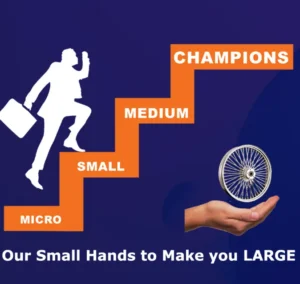MSME Udyam Schemes and Initiatives
in this Blog, we will read MSME Udyam Schemes and Initiatives by Govt
Government Initiatives to Support MSMEs
The Indian government has implemented various initiatives and programs to support the growth and development of Micro, Small, and Medium Enterprises (MSMEs) across the country. These initiatives aim to address the challenges faced by MSMEs, enhance their competitiveness, and promote their sustainability. Here are some key government initiatives to support MSMEs:
Prime Minister’s Employment Generation Programme (PMEGP):
- PMEGP is a credit-linked subsidy scheme launched by the Ministry of Micro, Small & Medium Enterprises (MSME) to facilitate self-employment opportunities through the establishment of micro-enterprises.
- Under PMEGP, financial assistance is provided for setting up new projects or expanding existing ones, with a focus on generating employment in rural and urban areas.
Credit Assurance Asset Trust for Miniature and Little Endeavors (CGTMSE):
- CGTMSE provides credit guarantee cover to banks and financial institutions for loans extended to MSME borrowers without the need for collateral.
- This scheme encourages banks to extend credit to MSMEs, especially startups and small enterprises, by mitigating the risk of default.
National Small Industries Corporation (NSIC) Schemes:
- NSIC implements various schemes to promote MSMEs, including the Single Point Registration Scheme (SPRS) for participation in government purchases, Consortia and Tender Marketing Scheme (CTM), and Raw Material Assistance Scheme (RMA).
- These schemes provide MSMEs with access to procurement opportunities, marketing support, and assistance in procuring raw materials at concessional rates.
Technology Upgradation Fund Scheme (TUFS):
- TUFS provides financial assistance to MSMEs for upgrading their technology and machinery to adopt energy-efficient and environmentally sustainable practices.
- This scheme aims to enhance the competitiveness of MSMEs by facilitating the modernization of their production processes and equipment.
MSME Support and Outreach Schemes Program:
- The MSME Support and Outreach Program launched by the government focuses on addressing challenges faced by MSMEs, including access to credit, market linkages, and technology adoption.
- Through this program, MSMEs receive assistance in availing government schemes and services, capacity building, and market access facilitation.
Cluster Development Schemes Programs:
- The government supports the development of MSME clusters through financial assistance for infrastructure development, common facilities, technology adoption, and skill development.
- Cluster development programs aim to promote cooperation, collaboration, and collective growth among MSMEs operating in specific geographical areas or sectors.
Ease of Doing Business Reforms:
- The government has undertaken several reforms to improve the ease of doing business for MSMEs, including simplification of regulations, digitization of processes, and reduction in compliance burden.
- These reforms aim to create a conducive business environment for MSMEs to thrive, innovate, and contribute to economic growth.
Overall, these government initiatives play a vital role in supporting the MSME sector, fostering entrepreneurship, and creating employment opportunities, thereby contributing to inclusive and sustainable economic development in India.
Skill Development Programs
Skill development programs are integral to the growth and sustainability of Micro, Small, and Medium Enterprises (MSMEs) in India. These programs focus on enhancing the capabilities and competencies of MSME entrepreneurs, managers, and workers, thereby improving productivity, quality, and innovation within the sector. Here’s how skill development programs relate to MSMEs:
Enhancing Entrepreneurial Skills:
- Entrepreneurial skills are essential for starting and managing a successful business. Skill development programs for MSME entrepreneurs focus on areas such as business planning, financial management, marketing, and innovation.
- By acquiring these skills, MSME entrepreneurs can make informed decisions, identify growth opportunities, and navigate challenges effectively, thereby increasing the chances of business success and sustainability.
Improving Technical and Vocational Skills:
- MSMEs often operate in sectors that require specific technical and vocational skills, such as manufacturing, construction, textiles, and handicrafts. Skill development programs focus on providing training and certification in these specialized skills.
- By improving technical and vocational skills, MSME workers become more proficient in their roles, leading to higher productivity, better quality output, and increased competitiveness for MSMEs in domestic and international markets.
Promoting Innovation and Technology Adoption:
- Skill development programs play a crucial role in promoting innovation and technology adoption among MSMEs. Training programs focus on emerging technologies, digital skills, and advanced manufacturing techniques relevant to the MSME sector.
- By acquiring skills in areas such as automation, artificial intelligence, data analytics, and digital marketing, MSMEs can modernize their operations, improve efficiency, and stay competitive in rapidly evolving markets.
Addressing Skill Gaps:
- Skill development programs help address skill gaps within the MSME sector by identifying the specific training needs of MSMEs and customizing training modules accordingly.
- These programs target both existing MSME workforce and aspiring entrepreneurs, providing them with the necessary skills and knowledge to meet the evolving demands of the market and industry standards.
Facilitating Access to Skilled Talent:
- Skill development programs contribute to building a pool of skilled talent within the MSME sector, thereby addressing the challenge of talent acquisition and retention faced by small businesses.
- By investing in skill development, MSMEs can attract qualified employees, reduce recruitment costs, and create a conducive work environment that fosters employee growth and development.
Supporting Sectoral Development:
- Skill development programs cater to the specific needs of different sectors within the MSME ecosystem, including traditional industries, high-tech sectors, and service-oriented businesses.
- By promoting sector-specific skills, these programs contribute to the overall growth and diversification of the MSME sector, driving economic development and job creation across various industries and regions.
